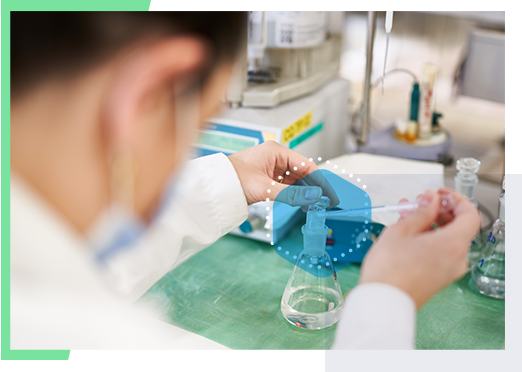Product
Overview
We produce an extensive range of hydrolysates and technical ingredients to support applications ranging from laboratory research to large-scale industrial fermentation

Peptones and magnesium
with a pharma focus

Reliability, stability and traceability
Throughout the years, we have managed to adapt to the many requirements of our customers.
We offer more than sixty references, with full raw materials traceability and growth performance consistency.
Vegetable hydrolysates
Vegetable Peptones are manufactured through enzymatic hydrolysis of selected vegetal raw materials rich in proteins.
Vegetal peptones are protein-derived nutrients obtained through the controlled enzymatic of plant-based protein sources. T
hese hydrolysates serve as essential components in culture media and fermentation applications.
They represent a sustainable alternative to animal-derived protein sources while offering consistent nutritional profiles for biotechnological applications.
The enzymatic preparations traditionally used in industrial applications have long been based on natural active materials such as Papain.
however, biotech enzymes obtained through fermentation processes using genetically modified microorganisms are increasingly being adopted in current developments.
The selection of appropriate vegetal raw materials represents a challenging task requiring extensive evaluation of multiple factors. Beyond offering adequate physico-chemical properties necessary for efficient hydrolysis processes, the selected raw materials must demonstrate reliable long-term availability across worldwide markets to ensure consistent production capabilities and supply chain security.
Recognizing the inherent variability of natural materials, Organotechnie has established a comprehensive range of rigorous testing protocols and quality control measures. These extensive tests are specifically designed to ensure consistency of raw material properties and performance characteristics.
Casein hydrolysates
Casein Peptones are produced through the enzymatic hydrolysis of bovine milk phosphoproteins
Casein peptones are protein hydrolysates derived from milk casein, which is the primary protein component found in mammalian milk.
These peptones are produced through enzymatic hydrolysis processes that break down casein into smaller, more readily available peptides and amino acids.
Casein peptones have been widely used in microbiological culture media due to their excellent nutritional properties and ability to support robust microbial growth in various fermentation and cell culture applications.
As with vegetal peptones, the enzymatic preparations traditionally used for casein hydrolysis have relied on natural active materials, with trypsin being one of the most commonly employed.
Biotech enzymes obtained through fermentation processes are increasingly being utilized in contemporary casein peptone production.
In order to avoid any potential BSE (Bovine Spongiform Encephalopathy) contamination risks, Organotechnie has implemented strict sourcing protocols and exclusively uses milk proteins that are produced in countries that remain unaffected by BSE outbreaks, such as New Zealand, which maintains rigorous animal health standards and surveillance programs.
Furthermore, as an additional quality and safety measure, the casein used in Organotechnie’s peptone production comes from milk that was initially intended for human consumption, ensuring that it meets the highest food safety standards and regulatory requirements before being processed into specialized peptone products.
Meat hydrolysates
Meat Peptones are manufactured through enzymatic hydrolysis of selected animal tissues
Beef animal tissues have been used for the manufacturing of Peptones because these materials are widespread over the world. bovine or pork animal tissues are used, or a combination of these.
Due to the outbreak of the BSE and the precautionary measures that were enforced thereafter and in particular within the pharmaceutical industry, the use of beef material had become questionable until guidelines regarding « the risk of transmission of TSE diseases » were issued by the competent authorities. Organotechnie Meat Peptones comply with those guidelines, and beef materials are sourced from unaffected countries such as New Zealand. Our meat peptones come with a certificate of suitability vs TSE risk.
Biotech enzymes obtained by fermentation are more and more in use nowadays.
Gelatin Peptones are manufactured through enzymatic hydrolysis of selected European pig gelatin. They offer a particular growth promotion profile and their use is mostly in the diagnostic area for select media. Gelatin N3 is an enriched in yeast extract version of Gelatin N2
Yeast extracts
Our yeast extracts are produced through autolysis of carefully selected Saccharomyces cerevisiae strains and are certified as non-GMO and animal-free.

Malt Extracts
Malt Extracts are water soluble extracts manufactured from malted barley
Our Malt Extracts consist of water-soluble extracts that are specifically manufactured from high-quality malted barley through controlled processing methods. These extracts serve as an excellent and reliable carbohydrate source ingredient that is extensively utilized in the manufacturing and formulation of Dehydrated Culture Media and various types of Fermentation Media applications.
Our Malt Extract product line is available in multiple specialized formulations to meet diverse industrial requirements. We offer a Low Iron level extract version that has been specifically developed and optimized for DT Production processes for instance.
Additionally, our range includes variants that are enriched with yeast extract, providing enhanced nutritional profiles that combine the carbohydrate benefits of malt extract with the additional amino acids, vitamins, and growth factors naturally present in yeast extract components.
These specialized formulations allow manufacturers to select the most appropriate malt extract variant based on their specific application requirements, whether they need standard carbohydrate supplementation, low iron content for sensitive processes, or enhanced nutritional content through yeast extract enrichment for improved microbial growth and productivity in their culture media preparations.
Magnesium Pidolate API
A highly water soluble Magnesium Salt with an organic part for human supplementation
Magnesium Pidolate or Magnesium Pyrrolidone Carboxylate is a salt of Pyroglutamic Acid manufactured by chemical synthesis. Its molecular formula is C10H12N2O6Mg.
Organotechnie product complies to the Monograph 1619 of the European Pharmacopoeia latest Edition. The Pharmaceutical industry uses Magnesium Pidolate to manufacture drugs for patients who suffer from Magnesium deficiencies.
Magnesium Pidolate is also used as a supplement in the Nutraceutical and the Animal Nutrition industry.
It is obtained by cyclisation of Glutamic Acid, thus our salt becoming highly bioavailable with excellent tolerance. It has a high absorption rate, so it can easily be converted into a liquid supplement.


